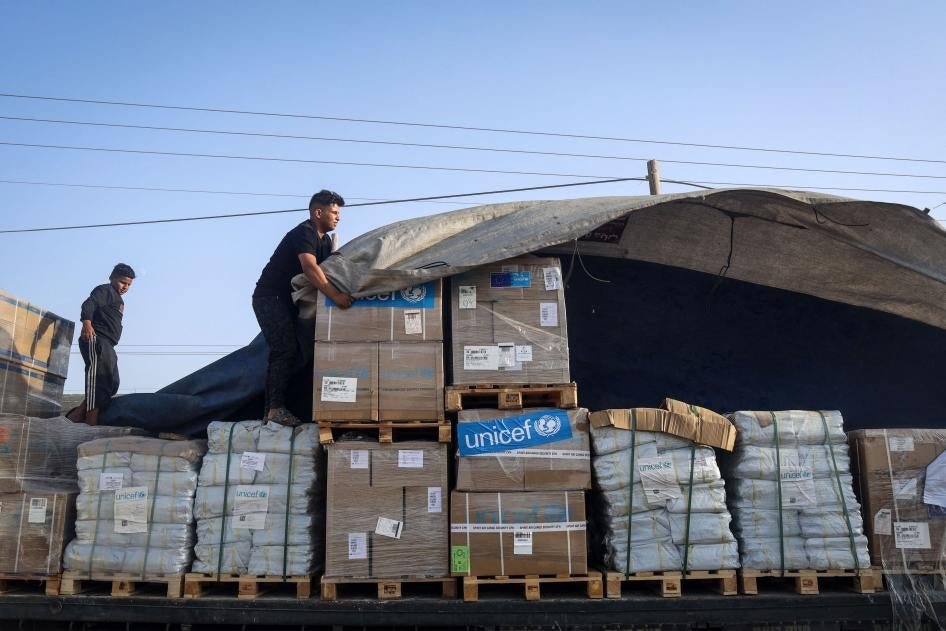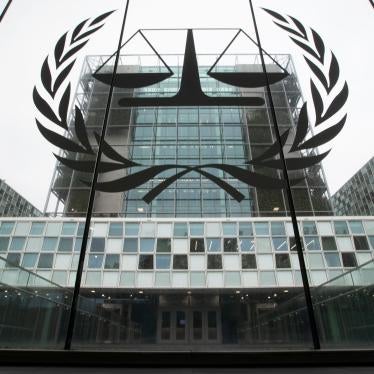There’s not enough food in Gaza. Since October 7 the Israeli government has cut water and electricity from its territory, closed its truck crossing with Gaza, and obstructed the delivery of relief supplies to the enclave’s 2.2 million people, nearly half of whom are children. The shortage of clean drinking water is especially dangerous. Israel has refused to allow fuel onto the scarce aid trucks entering via Egypt, even though it’s needed to power hospital generators, ambulances, and water pumps. Israeli officials have declared that no aid will enter Gaza from Israel, and they justify banning fuel shipments, even via Egypt, on the grounds that fuel would “enable Hamas to continue its attacks on Israeli citizens.” On October 15 Israel announced that it was partially restoring the water supply to Gaza’s south, but without fuel to pump it, delivery is limited, and the north remains cut off.
The Israeli government continues to obstruct this desperately needed humanitarian aid even as it carries out its campaign of aerial bombardment and expands its ground operations in Gaza. The army has told more than a million people to evacuate the northern half of the enclave, but there’s no safe place to go and no safe way to get there. Israeli forces are using explosive weapons in densely populated areas, a practice that predictably causes high civilian casualties. Eighty-three countries, including the United States, have signed a political commitment to refrain from using explosive weapons with wide-area effects—including heavy artillery and aerial bombs—in such areas because of how likely they are to kill and injure civilians indiscriminately. Israel’s continual bombardments of Gaza—and Palestinian armed groups’ indiscriminate rocket attacks on Israeli communities—magnify this concern many times over. Israel has also used white phosphorus, incendiary material that burns human flesh and can cause lifelong suffering, in populated areas in Gaza—an act that violates the laws-of-war prohibition against putting civilians at unnecessary risk.
The heavy bombardment has disrupted telecommunications, impeding emergency services. And despite its obligation to protect all of Gaza’s civilians, Israel has warned the many civilians who can’t or won’t evacuate northern Gaza—including doctors and hospital patients—that they risk being considered “complicit with a terrorist organization” if they stay. According to Gaza’s health ministry, more than eight thousand Palestinians, among them more than 3,300 children, have been killed; according to the UN, nearly half of Gaza’s housing units have been destroyed or damaged.
Nothing can justify the Hamas-led massacres of Israeli civilians on October 7. These were war crimes. Neither can anything justify the war crimes that Israel is committing in Gaza—including by depriving civilians of life-saving humanitarian aid. The laws of war require parties to facilitate the rapid delivery of relief supplies, subject to inspection and monitoring to prevent diversion or arms delivery. Israel can, in other words, monitor the shipments organized by the UN, but it cannot block a life-saving supply, which is what fuel is to Gaza right now.
The current restrictions on aid are reducing food and fuel supplies to far below the “humanitarian minimum” that Israel’s own officials unilaterally set for Gaza years ago. In 2007, after Hamas took over government functions in Gaza, the Israeli government launched a policy of deliberately reducing even humanitarian supplies into the Strip, saying that it was conducting “economic warfare” against Hamas and that its obligations to civilians in Gaza were limited to avoiding a “humanitarian crisis.” Then, as now, Gaza, which is surrounded by walls and fences and bounded by the Israeli-patrolled coast, was dependent on Israel for supplies. As part of this policy, the Israeli government even calculated the number of calories that, it said, residents of Gaza needed to survive, based on gender and age. Israel was obligated, it argued, to allow that amount in—but not more. In 2007, together with other human rights lawyers from Gisha and Adalah, I challenged that policy, which reduced human dignity to mathematical formulas and deliberately restricted food and fuel supplies to Palestinian civilians. The Israeli Supreme Court accepted the argument that the Israeli military’s minimum commitments would prevent a “humanitarian crisis” and rejected our petition.
Fifteen years ago fewer people lived in Gaza; conveyer belts still brought grain to the enclave; electricity and drinking water still flowed from Israel; farmers, fishers, and others were producing food; and hospitals were not struggling to treat 20,000 injured people. At that time, the Israeli military said that Gaza needed 106 trucks a day to meet its minimum humanitarian needs, including hundreds of thousands of liters of fuel. In the twenty-three days since October 7, a total of 117 trucks have entered Gaza, none of them carrying fuel.
The Israeli army claims that fuel and food shipments are not necessary because Gaza has enough. Hamas “is creating the public perception of a fuel shortage,” the Israeli Defense Ministry told diplomats this week in briefing documents obtained by Human Rights Watch. That’s not what Israel’s own mathematical calculations predicted, and it’s not what aid workers say. On Friday, Philippe Lazzarini, who heads UNRWA, the largest aid organization in Gaza, warned that “the last remaining public services are collapsing, our aid operation is crumbling.” He reminded the Israeli government what it knows very well: UNRWA has mechanisms for monitoring shipments to prevent diversion, and aid agencies are committed to ensuring that their aid reaches its intended civilian recipients. Those recipients are growing more desperate. On Saturday thousands of people broke into UNRWA warehouses to take flour and hygiene supplies.
International humanitarian law requires Israel, as the occupying power in Gaza, to take affirmative steps to ensure the welfare of civilians. In previous hostilities, brutal as they were, the Israeli government at least partially acknowledged these obligations. In each of its four wars in Gaza since 2008, it maintained the flow of drinking water and electricity into Gaza—recognizing that civilians in the Strip depended on the grids and water pipes laid between Gaza and Israel—and found ways to open the Israeli crossings for humanitarian delivery.
In this current escalation the Israeli government is going as far as its most powerful backer, the United States, will allow. (President Joe Biden personally negotiated the meager trickle of humanitarian supplies now arriving via Egypt.) US policymakers who were rightly outraged at Hamas’s war crimes against Israeli civilians should not stand by while the Israeli government commits war crimes against Palestinian civilians. The US should insist that Israel immediately allow monitored fuel and other supplies into Gaza via Egypt and its own territory, restore water and electricity to all parts of Gaza, and abide by its obligations to protect civilians in Gaza, wherever they are.








